Typical Signs You Have Seasonal Allergies
- Symptoms of seasonal allergies
- 1. Typical allergies symptoms
- 2. Less common signs you have seasonal allergies
- 3. You don't have these symptoms of seasonal allergies
- Causes of seasonal allergies
- Spring
- Summer
- Autumn
- Winter
- Allergies or COVID-19, How to Tell the Difference?
- What should I do when I have a seasonal allergy?
- Conclusion
People with seasonal allergies when exposed to adverse factors will develop allergy symptoms very quickly. In this article, we are going to present typical signs you have seasonal allergies and tips to cope with them.

Signs you have seasonal allergies: Sneezing
Symptoms of seasonal allergies
1. Typical allergies symptoms
There's a good chance you have seasonal allergies if you have any of the following symptoms:
-
Sneezing
-
Itchy eyes
-
Runny nose
-
Congestion
-
Postnasal drip
-
Itchy throat
-
Watery eyes
2. Less common signs you have seasonal allergies
Those symptoms above are obvious, but your allergies might not show up in one way. The following signs are less common, but may still indicate seasonal allergies:
-
Wheezing
-
Coughing
-
Headache
3. You don't have these symptoms of seasonal allergies
Colds and allergies share many same symptoms such as coughing and runny nose, so it can be tough to tell which one you're going through. If you're experiencing any of these symptoms, there's a good chance you have a cold:
-
Fatigue
-
Aches and pains throughout your body
-
Weakness
-
Severe headache
-
Sore throat is not one of the signs you have seasonal allergies
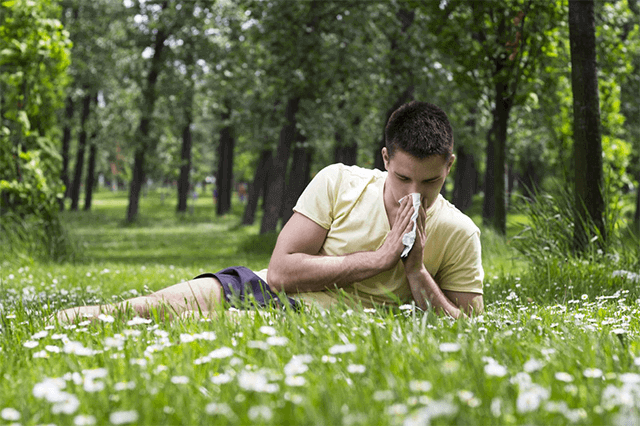
Typical Signs You Have Seasonal Allergies
The most important difference is the duration of your symptoms. Usually, colds don't last longer than 14 days whereas allergies can persist for months depending on what you are allergic to.
If you have symptoms lasting for more than 2 weeks, don’t hesitate to see your doctor as these may be signs of allergy or another problem.
Is seasonal allergy dangerous?
Allergy reactions can range from mild to severe, depending on the substance involved and each’s immune system.
For summer allergies, when the body temperature rises, sweat will be released and our skin will always be in a wet state. This leads to inflammation, making allergies worse.
A rash is one of the most typical signs you have seasonal allergies. It occurs in winter, the lower temperature makes the air drier, which is the reason why allergies occur. Even when it's raining or windy, this allergy can occur.
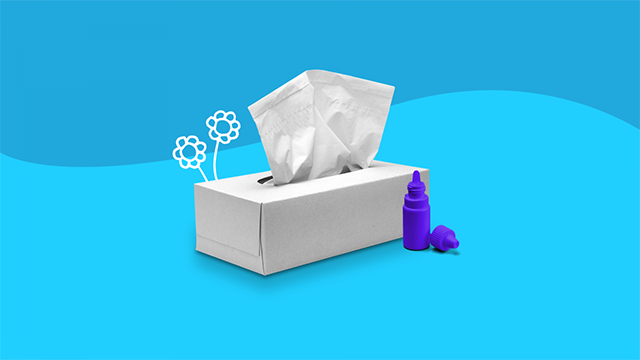
Common signs you have seasonal allergies
Seasonal allergies include acute and chronic forms. If the disease is in an acute state, it will last from 24 hours to less than 6 weeks, the clinical manifestations are itchy symptoms, causing discomfort for the patient.
If these symptoms of seasonal allergies are not treated promptly and properly, they will turn into the stage of chronic seasonal allergies that pose a threat to the body with manifestations of edema, skin infection, hypotension, anaphylaxis, the worst-case scenario will lead to death.
Causes of seasonal allergies
Seasonal allergies happen when your immune system responds to an airborne substance by releasing histamines and other chemicals into your bloodstream. Those chemicals produce signs you have seasonal allergies. The causes of hay fever are different among seasons.
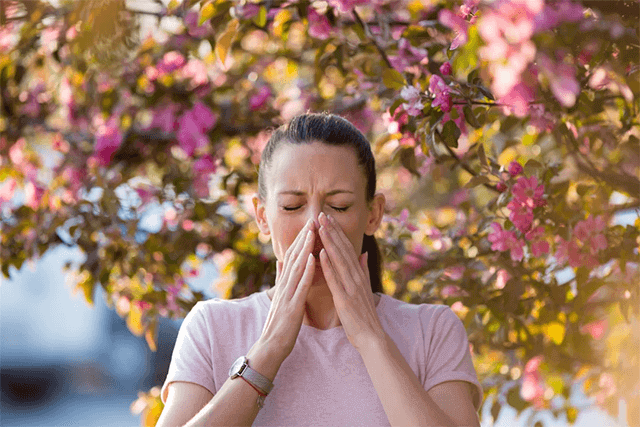
Signs you have seasonal allergies: Runny nose, congestion
Spring
In spring, seasonal allergies are mostly caused by trees. The pollen of birch is one of the most common offenders in northern latitudes causing hay fever. There are also other allergenic trees in North America: Cedar, horse chestnut, and poplar.
Summer
The name of hay fever origins from the hay-cutting season. But the real triggers of seasonal allergies in summer months are grasses and certain weeds. According to the Asthma and Allergy Foundation of America, grasses are the most common culprit of hay fever.
Autumn
Autumn is ragweed season. They grow in temperate regions of North and South America and are difficult to control. Their pollen is also the cause of signs you have seasonal allergies. Others drop their pollen in the autumn including nettles, mugworts, sorrels, fat hens, and plantains.
Winter
For those with hay fever, the winter brings the feeling of relief as most outdoor allergens lie dormant. But you may experience indoor allergens, such as mold or pet dander.
Removing indoor allergens is often easier than outdoor pollen. Here are a few tips to get rid of common allergens in your home.

Signs you have seasonal allergies are easy to realize
-
Wash your bedding at least once a week with hot water to sterilize
-
Use allergen-proof covers for bedding and pillows
-
Remove carpets, upholstered furniture, and stuffed toys.
-
Fix water leaks and clean up water damage.
-
Clean moldy surfaces and any places that mold may form.
-
Reduce excess moisture using a dehumidifier
Allergies or COVID-19, How to Tell the Difference?
In these times, with every sneeze, cough, or tickle in the throat, many people wonder: Do I have COVID-19? For the millions of allergy sufferers around the country, this question becomes a little more complex — allergies or COVID-19 or a cold? Following are some key differences between seasonal allergies and COVID-19.
1) Duration and past history.
-
Those with allergies often have a history of seasonal allergies.
-
Signs you have seasonal allergies tend to be more long-lasting.
2) Allergy symptoms often respond to allergy medications.
3) Itchiness is a symptom of allergies, not for viral illness.
4) Those with allergies do not develop a fever while people with COVID-19 do.
5) Patients with allergies may cause wheezing while COVID-19 typically does not.
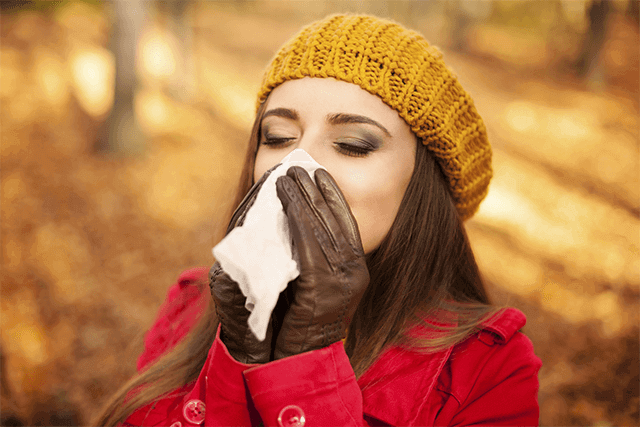
Less common signs you have seasonal allergies
What should I do when I have a seasonal allergy?
Seasonal allergies can be an uncomfortable condition to live with. The key to reducing symptoms is limiting your exposure to triggers such as dust, mold spores, or pollen by following these ways:
-
Shut your windows when your allergies are active
-
Use an air purifier
-
Wear a dust mask
-
Check your local weather for pollen forecasts
-
Maintain your hygiene to get rid of pollen that is attached to your clothes, hair, and skin.
Keep yourself away from alcohol to avoid provoking an allergic condition. Eat enough nutrients, lots of fruits, vegetables, green tea and have a reasonable working and resting regimen to increase the body's resistance.
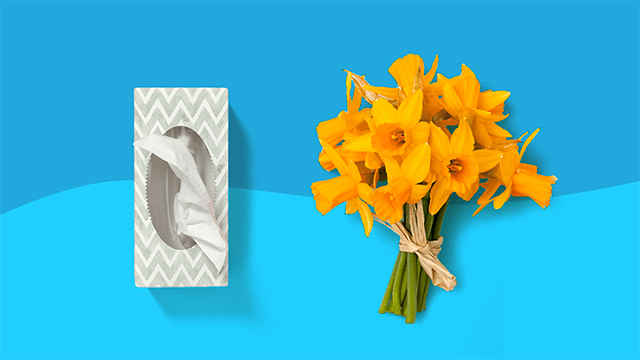
Do you know signs you have seasonal allergies?
If allergy-reducing treatments do not work, you should immediately see a specialist for prompt diagnosis and treatment. The disease will have undesirable complications if the allergic condition persists. Regarding signs you have seasonal allergies, they are pretty difficult to completely treat, but we can certainly treat most symptoms with medications over-the-counter or prescribed by your doctor.
If you can't control your symptoms with medications, the doctor could send you to an allergist or even an ear, nose, and throat specialist to do some allergy testing.
Conclusion
Above we’ve mentioned causes and typical signs you have seasonal allergies. If your allergies aren't severe, then it’s OK to take an over-the-counter allergy pill. But if they are, though, you might need to go for an allergy test to find out what you are allergic to and get the necessary medical treatment.
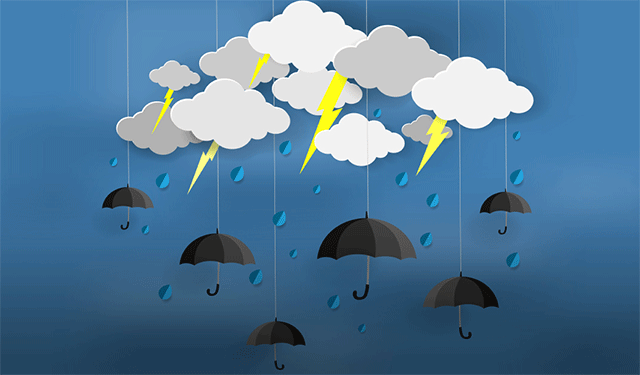








0 Comments
Leave a Comment
Your email address will not be published. Required fields are marked *